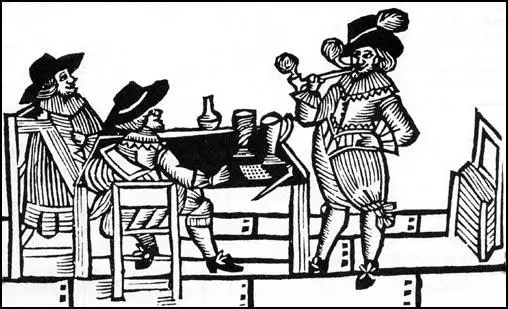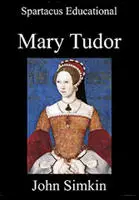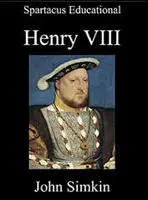Tobacco in Tudor England
On 2nd November 1492, Christopher Columbus, the captain of the Santa Maria, came across the island of Cuba. Columbus sent two men in a small boat to explore the island. When they arrived back they told the strange story of people with burning sticks in their mouths.
During the next few years European explorers discovered that people all over the Americas smoked tobacco. These Indians believed that chewing or smoking tobacco protected them from a variety of different diseases. Some European explorers, frightened that they might catch these local diseases, also began to smoke tobacco. When these men went home they took large supplies of tobacco with them.
One explorer, Jacques Carrier, commented: "They (Native Americans) grow a certain kind of herb... they make powder of it and put it in a pipe... they set light to it at one end... and at the other end suck so long that they fill their bodies full of smoke... till it comes out of their mouth and nostrils... They say it keeps them in good health." John Hawkins visited Florida in 1565: "The Floridians have a kind of dried herb that they smoke... they say the smoke satisfies their hunger, and they can live for four or five days without meat or drink."

There are several reports of large crowds forming in London to watch men smoking tobacco. At first people thought it was extremely funny that anyone should want to smoke tobacco. However, attitudes began to change in the late 1580s. The man blamed for this was Walter Raleigh. In 1586, a friend of Raleigh's who had been living in America, gave him a day pipe and a large supply of tobacco, and Raleigh soon became addicted to smoking. Raleigh was a much admired figure in England and soon large numbers of people were following his example.
A German visitor, Paul Hentzner, visited London in 1598, and commented: "At these spectacles (plays and bear-baiting), and everywhere else, the English are constantly smoking the nicotine weed, which in America is called tobacco."
James I was strongly opposed to people smoking. He commented: "Why should we imitate the barbarous and beastly manners of the wild and godless Indians? Why do we not as well imitate them in walking naked as they do? Why do we not deny God and adore the Devil, as they do?... Smoking is... hateful to the nose, harmful to the brain and dangerous to the lungs." Whereas Elizabeth only imposed a two pence a pound tax on tobacco, James changed this to six shillings and eight pence. He also tried to persuade English colonists in America to stop growing tobacco. James even wrote a pamphlet pointing out the dangers of smoking. However, all these measures failed to stop large numbers of people taking up the habit.
| Spartacus E-Books (Price £0.99 / $1.50) | ||||||
|---|---|---|---|---|---|---|
Primary Sources
(1) Jacques Carrier explored Canada between 1534 and 1536.
They grow a certain kind of herb... they make powder of it and put it in a pipe... they set light to it at one end... and at the other end suck so long that they fill their bodies full of smoke... till it comes out of their mouth and nostrils... They say it keeps them in good health.
(2) Sir John Hawkins visited Florida in America in 1565.
The Floridians have a kind of dried herb that they smoke... they say the smoke satisfies their hunger, and they can live for four or five days without meat or drink.
(3) In 1598 Paul Hentzner, a German lawyer visited England.
At these spectacles (plays and bear-baiting), and everywhere else, the English are constantly smoking the nicotine weed, which in America is called tobacco.
(4) James I, Counterblast to Tobacco (1616)
Why should we imitate the barbarous and beastly manners of the wild and godless Indians? Why do we not as well imitate them in walking naked as they do? Why do we not deny God and adore the Devil, as they do?... Smoking is... hateful to the nose, harmful to the brain and dangerous to the lungs.
(5) Bamaby Rich, The Honesty of this Age (1614)
It is reported that 7,000 houses live by the trade of tobacco-selling... the sum total amounts to £399,375 a year... They say it is good for a cold... for aches... and for all manner of diseases... but those that do smoke, are as much (or more) subject to these illnesses... than those that have nothing to do with it.
(6) Thomas Harriot visited America in 1585. When in America Harriot became addicted to tobacco. It is believed that Harriot was the first man from England to die of lung cancer because of smoking tobacco.
You will observe sailors and all others who come back from the New World smoking tobacco... By this they say their strength is restored and their spirits refreshed... We have discovered nothing from the New World that is more valuable than this plant... it is a remedy for sores, wounds, infections of the throat and chest and the plague.
(7) In 1698 Celia Fiennes visited Cornwall. In her journal she recorded having a meal in St Austell.
I was very pleased with my supper though not with the custom of universal smoking. Both men, women and children have their pipes of tobacco in their mouth and sit round the fire smoking. This was not delightful to me and so I left the room.
Student Activities
Codes and Codebreaking (Answer Commentary)
Francis Walsingham - Codes & Codebreaking (Answer Commentary)
Henry VIII (Answer Commentary)
Henry VII: A Wise or Wicked Ruler? (Answer Commentary)
Henry VIII: Catherine of Aragon or Anne Boleyn?
Was Henry VIII's son, Henry FitzRoy, murdered?
Hans Holbein and Henry VIII (Answer Commentary)
The Marriage of Prince Arthur and Catherine of Aragon (Answer Commentary)
Henry VIII and Anne of Cleves (Answer Commentary)
Was Queen Catherine Howard guilty of treason? (Answer Commentary)
Anne Boleyn - Religious Reformer (Answer Commentary)
Did Anne Boleyn have six fingers on her right hand? A Study in Catholic Propaganda (Answer Commentary)
Why were women hostile to Henry VIII's marriage to Anne Boleyn? (Answer Commentary)
Catherine Parr and Women's Rights (Answer Commentary)
Women, Politics and Henry VIII (Answer Commentary)
Historians and Novelists on Thomas Cromwell (Answer Commentary)
Martin Luther and Thomas Müntzer (Answer Commentary)
Martin Luther and Hitler's Anti-Semitism (Answer Commentary)
Martin Luther and the Reformation (Answer Commentary)
Mary Tudor and Heretics (Answer Commentary)
Joan Bocher - Anabaptist (Answer Commentary)
Anne Askew – Burnt at the Stake (Answer Commentary)
Elizabeth Barton and Henry VIII (Answer Commentary)
Execution of Margaret Cheyney (Answer Commentary)
Robert Aske (Answer Commentary)
Dissolution of the Monasteries (Answer Commentary)
Pilgrimage of Grace (Answer Commentary)
Poverty in Tudor England (Answer Commentary)
Why did Queen Elizabeth not get married? (Answer Commentary)
Sir Thomas More: Saint or Sinner? (Answer Commentary)
Hans Holbein's Art and Religious Propaganda (Answer Commentary)
1517 May Day Riots: How do historians know what happened? (Answer Commentary)




